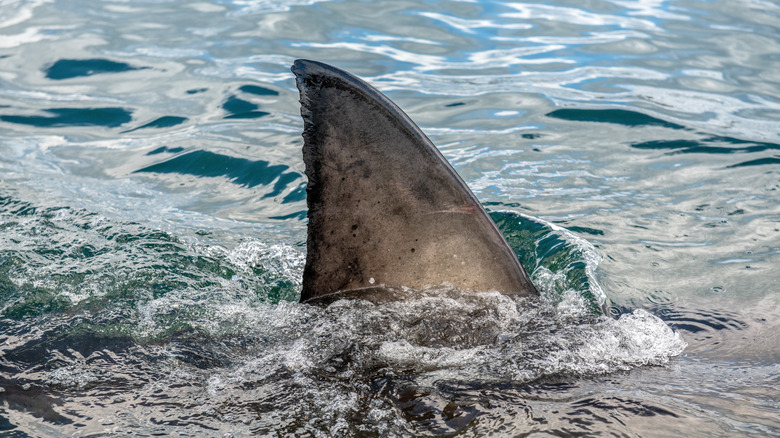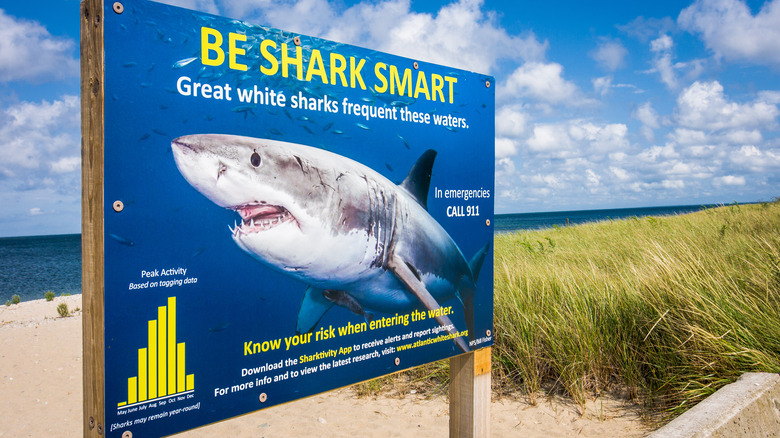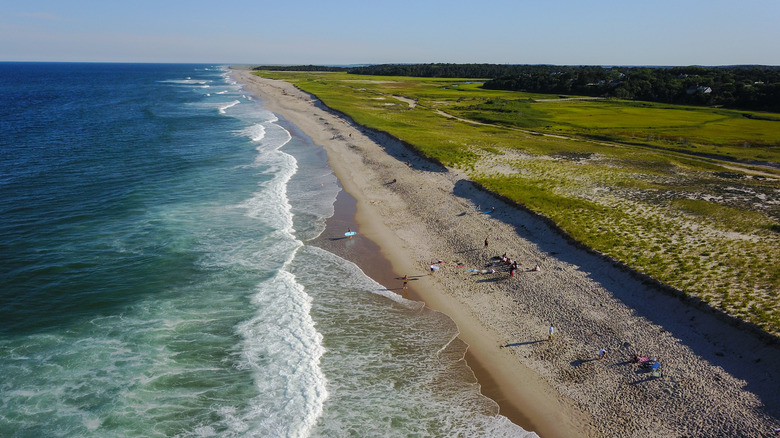This Deadly US Beach Has Earned The Horrifying Name Of The World's 'Great White Capital'
This isn't the Caribbean's dangerous West End beach or Brazil's deadly Boa Viagem Beach — it's Cape Cod. In recent years, the number of great white sharks swimming around this quaint Massachusetts beach town has soared, marking a real victory for conservation. However, the increase in the number of sharks also means greater danger for people swimming in the waters. In 2018, the shocking death of Arthur Medici (a surfer from Revere) made Cape Cod's transformation from a swimming destination to a dangerous great white hotspot feel very real.
"This is part of their historical migration that's probably been going on for millions of years," Shark biologist Greg Skomal explained (via Boston). The lack of sharks in the region was due to the aggressive overhunting of seals in Massachusetts, and now, things are returning to the way they once were. What does that mean for the tourists who flock to Cape Cod every year to swim and surf and the locals who rely on their business to stay afloat?
With the high numbers of great white sharks being reported in Cape Cod's coastal waters, some tourists will doubtless choose to take their relaxing beach vacation elsewhere. However, for some, the chance to see a great white shark free and in the wild is too exciting of an opportunity to miss, despite the massive risks that come with it.
How to stay safe at Cape Cod
In 2012, one shark's bite severed the tendons in one swimmer's leg. In 2014, another shark capsized two kayaking women, destroying one vessel. In 2017, a man's paddleboard struck a shark, and the animal bit down on the board and his leg, with the man lucky to escape with only a hematoma. In 2018, a man was seriously injured by a shark's bite, surviving only after managing to strike the shark's gills. A month or so later, Medici was killed. The risk of shark bites is still low, even in Cape Cod, but it happens. In an excellent piece in The New York Times, C.J. Chivers put it best, saying that "the quantity of large sharks, and fears that have accompanied them, have caused a cultural trauma, reshaping how people experience the ocean and forcing coastal communities into a period of reckoning and adaptation.
As an aquatic biologist told The Patriot Ledger, those interested in swimming in Cape Cod must remember one thing: "Don't swim with the bait." If you see seals playing in the water or birds swooping to catch fish, that's a peak hunting ground for sharks. Just like you can check the jellyfish forecast to avoid sea jellies on vacation in Hawaii, find out if it's safe to swim in Cape Cod by downloading the app Sharktivity from AWSC., which tracks the movement of sharks tagged by researchers and aggregates data submitted by users to determine how many great whites are around beaches.
The return of the sharks
A few decades ago, there was a serious risk that great white sharks would vanish from the Atlantic Ocean. Today, the population is thriving, thanks largely to the Marine Mammal Protection Act, which has made it illegal to slaughter the seals living in the area. The previously-struggling seal population is large enough to support their natural predator. Megan Winton, a researcher for AWSC, told PBS, "The best estimate is over that four-year period that 800 individual white sharks visited the waters off of Cape Cod."
A new industry has sprung up around the sharks in Cape Cod, with visitors coming to the beaches to appreciate these incredible animals. The president of the Chatham Chamber of Commerce told National Geographic, "I was a little nervous at first. I run a hotel and all of a sudden people are talking about white sharks ... I'm like, 'God, is that going to affect us? But it's the opposite. There's more interest than ever."
The best way to see the sharks is to take one of AWSC's private charter boat trips. While they don't guarantee a sighting, sometimes the sharks are spotted before the boat even leaves the dock. These come at a premium, around $2,500 for up to six people, but your money goes towards researching the sharks. Your sightings go directly to the Sharktivity app, so spotting them in the wild also helps to keep beachgoers safe. Above all else, be careful.


